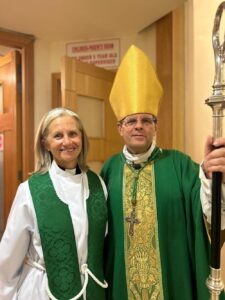The Reverend Canon Dr John Holdsworth writes: Each of the Gospels has its own way of reflecting on the significance of the cross, but the first three Gospels have in common one way of assessing its enduring effect. They say that at the moment of Jesus’s death, the curtain of the temple was torn in two completely, from top to bottom.
Whether this happened in fact or whether it was a metaphor is irrelevant to the message they are trying to convey. That message was that a significant moment had arrived in the history of religion. Religion had been a way of marking difference and maintaining difference. The Temple curtain separated the Jews from the Gentiles, separated the holy functionaries from the lay people, separated the men from the women and effectively separated the rich from the poor. It was in effect a symbol that said religion is about separation and the marking of difference.
With this dramatic picture of the curtain being opened, the whole religious landscape changes. Religion is no longer about marking and maintaining divisions but rather about healing divisions. It is no longer part of the problem but potentially part of the solution for human society. We use words like at-one-ment to describe its meaning. As Paul says later in 2 Corinthians, this has placed upon us the responsibility to be ambassadors for Christ and to recognize our ministry of reconciliation.
I have spent Holy Week leading an Ordination retreat for the Diocese of Thika in Kenya, one of the two Dioceses with which we are twinned; the other being Exeter in the UK. It has been an exhilarating experience. The Ordination service on Maundy Thursday, at which I was privileged to preach the sermon, was attended by 1600 people and lasted more than four hours. Many people disregard these twinning relationships and dismiss them as merely ceremonial. But I believe they do or at least can represent a working out of that torn curtain, where people of different expressions of religious conviction and different applications of the Christian good news to their lives, enter conversation with each other.
There are plenty in the world and in the Church who want to re-erect that torn curtain but our prayer should be that they will not succeed. The theological point at issue here is that different sexes, different ethnicities, different cultures and different understandings can be seen as part of God’s diverse creation and not part of human sinful intention. They can be seen as opportunities and not barriers. The saints of Thika greet you warmly. We are privileged to have them as partners.
Image credit: thegospelcoalition.org



